There are several varieties of mouthguards. Which one is best for you depends on the reason you need a mouthguard. Some styles are ideal for athletic use, while others are more appropriate for treating health-related issues.
Mouthguards are devices designed to shield your teeth from grinding or clenching during sleep or to prevent injuries during sports. They can also help reduce snoring and ease symptoms of obstructive sleep apnea.
Not all mouthguards are identical. They generally fall into three main categories based on intended use. Continue reading to explore the different kinds and discover which is most suitable for particular situations.

What are the types of mouthguards?
Stock mouthguards
Stock mouthguards are the most commonly found and affordable option. You can buy them at most sporting goods shops and pharmacies.
They typically come in small, medium, and large sizes and fit over your teeth. Most stock models cover only the upper teeth.
Although stock mouthguards are convenient and cost-effective, they have drawbacks. Their limited sizing often makes them uncomfortable and they usually do not fit snugly. This can also make speech difficult while wearing one.
The American Dental Association has awarded its Seal of Acceptance to the CustMbite Mouth Guard Pro.
Boil-and-bite mouthguards
Like stock guards, boil-and-bite mouthguards are widely available at drugstores and are relatively inexpensive.
Rather than multiple fixed sizes, boil-and-bite guards come in one form you can mold to your teeth. You soften the device by boiling it, then place it over your front teeth and bite down to shape it.
To achieve the best fit, be sure to follow the manufacturer’s instructions carefully.
Custom-made mouthguards
Your dentist can also craft a custom mouthguard for you. They take an impression of your teeth and use it to make a mouthguard tailored to your dental anatomy.
This yields a far superior fit compared with stock or boil-and-bite options, making them more comfortable and less likely to come loose during sleep.
If you grind your teeth, snore, or have sleep apnea, a custom-made mouthguard is often the most effective choice. Although pricier than over-the-counter guards, many dental insurance plans may cover part or all of the expense.
What type should I use?
Mouthguards may appear similar, but their functions can vary considerably.
Sports
Certain sports and activities carry a higher risk of falls or facial impacts. A mouthguard helps protect your teeth and prevents injuries to your lips or tongue.
It’s particularly important to wear a mouthguard if you participate in:
- football
- soccer
- boxing
- basketball
- field hockey
- ice hockey
- gymnastics
- skateboarding
- in-line skating
- cycling
- volleyball
- softball
- wrestling
For most sports, a stock mouthguard or a boil-and-bite model provides adequate protection. Stock guards are the most affordable and may be fine if you only need occasional protection.
Boil-and-bite guards, while a bit more costly, conform better to your teeth and are less likely to move. If you play high-impact sports, they may be the preferable choice.
Teeth grinding
Teeth grinding and clenching, known as bruxism, is a sleep-related movement disorder that can cause tooth sensitivity, jaw pain, and sore gums. It can also cause damage to the teeth.
Wearing a mouthguard at night helps keep the upper and lower teeth apart so they don’t wear each other down from grinding or clenching forces.
Usually, a custom-fitted mouthguard is recommended for bruxism. Stock guards are often uncomfortable and difficult to keep in place, which can disrupt sleep. While boil-and-bite models offer improved fit, they may become brittle with frequent use.
If you’re unsure whether you need a mouthguard for bruxism, you could try a boil-and-bite guard for a few nights. If it appears to help, consult your dentist about having a custom device made.
Sleep apnea
Sleep apnea is a potentially serious condition in which breathing repeatedly stops during sleep. This can reduce oxygen supply to the brain and increase the risk of heart disease and stroke. It can also cause loud snoring and leave you feeling exhausted the following day.
Many people with sleep apnea use a CPAP device to keep their airway open at night. For mild cases, a custom-made oral appliance can provide a similar benefit.
Rather than merely covering teeth, a mouthguard for sleep apnea works by moving the lower jaw and tongue forward to maintain an open airway. Some designs include a strap around the head and chin to reposition the lower jaw.
Stock and boil-and-bite mouthguards won’t improve breathing and aren’t suitable for this purpose.
Snoring
Mouthguards can also lessen snoring, which is caused by soft-tissue vibrations in the upper airway. They usually function similarly to sleep apnea appliances by advancing the lower jaw to keep the airway open.
There are many over-the-counter products marketed to reduce snoring, but research on their effectiveness is limited.
If snoring is disrupting your life, discuss mouthguard options with your dentist. They may fabricate a custom appliance or suggest a product that has helped other patients. You can also explore various home remedies for snoring.
Is there a mouthguard for braces?
How to care for your mouthguard
Because a mouthguard spends much of its time in your mouth, it’s important to protect it from damage and keep it clean.
To prolong the life of your mouthguard and maintain hygiene, follow these steps:
- Brush and floss your teeth before inserting your mouthguard.
- Rinse the mouthguard with cool water or mouthwash before placing it in your mouth and after removal. Avoid hot water, which can deform it.
- Clean it with a toothbrush and toothpaste after each use.
- Inspect regularly for holes or other damage; replace it if you find any.
- Bring your mouthguard to dental appointments so your dentist can confirm it still fits and functions properly.
- Store the guard in a rigid, ventilated case to protect it and allow it to dry between uses.
- Keep it away from pets, even when stored in a case.
Remember that mouthguards don’t last indefinitely. Replace yours when you notice wear, holes, or every two to three years. Stock and boil-and-bite guards may require more frequent replacement.
The bottom line
Whether for sports protection or to manage sleep-related issues, a mouthguard can provide safety and help improve sleep quality.
If you’re uncertain which type is right for you, consult your dentist. They can create a custom mouthguard or recommend a suitable over-the-counter option.


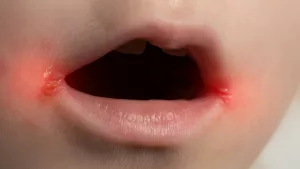

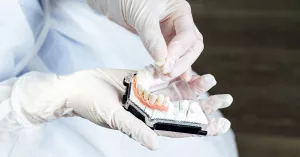
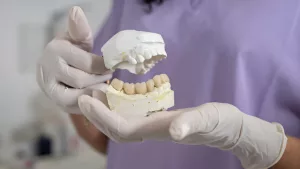
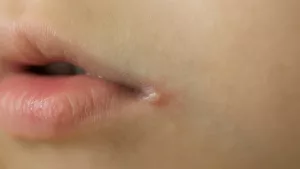

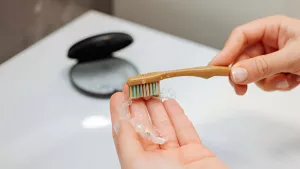











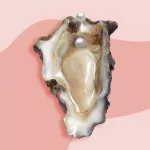




Leave a Reply
You must be logged in to post a comment.